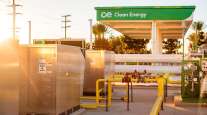Volvo Trucks to Introduce LNG Engine for Its Over-the-Road Vehicles in 2014
This story appears in the May 28 print edition of Transport Topics.
MIAMI BEACH — Volvo Trucks said it intends to introduce a liquefied natural gas engine for its heavy-duty over-the-road vehicles in 2014, which company officials hailed as the next step in the industry’s quickly evolving move toward natural gas as a primary fuel.
Olof Persson, CEO of Sweden-based Volvo Group, announced the new 13-liter engine during a press briefing here that was part of a joint meeting with the World Wildlife Federation on climate change. That meeting was timed with the Volvo Ocean Race, whose six contestants stopped off here before beginning the final leg of the around-the-world sailboat contest back to Europe.
Persson said LNG “has a great potential” as a fuel for longhaul trucking because it is so plentiful in the United States and is so much lower-priced than petroleum.
He said Volvo’s new engine would be more fuel-efficient than the compressed natural gas engines that Volvo currently offers to customers, primarily for urban bus customers and local delivery fleets.
Volvo also currently offers a 9-liter LNG engine that is made by a joint venture of Cummins Inc. and Westport Innovations and is primarily used in medium-duty and baby-8 applications. That same engine is available from several other truck OEMs.
Cummins-Westport is also currently at work on a 12-liter LNG version of its engine, which is expected to come to market next year. Both Cummins-Westport engines are modified versions of power plants that Cummins produces and run on diesel.
Persson said Volvo’s new engine would be unique to Volvo and its sister brand, Mack, but was being developed with Westport Innovations, based in Vancouver, British Columbia. The engine, he said, is in the early design stages and will behave like a traditional diesel engine.
Volvo’s engine will be a diesel injection model, meaning that diesel fuel will be used to begin the compression process to get the truck moving. As torque and speed build, the engine will burn LNG.
Westport currently offers a diesel injection engine that is available from Navistar on some of its medium-duty models. Navistar also sells a 7.6-liter, spark-ignited LNG engine for medium-duty uses.
The engines produced by the Cummins-Westport venture are spark-ignited LNG models and operate more like traditional gasoline engines than diesels, which rely on compression to ignite the fuel and not spark plugs.
Navistar Inc. earlier this year announced plans to develop a 13-liter, diesel injection model for its over-the-road trucks in conjunction with another developer, Clean Air Power Ltd., an English company with U.S. offices in Poway, Calif.
Navistar officials said its engine will burn about 15% diesel and 85% LNG; the current Westport version uses about 5% diesel.
While currently offering Cummins-Westport engines, Navistar officials said, they will offer natural gas versions of all their engines by the end of 2013.
Persson, meanwhile, said Volvo’s strategy on engines and fuels “is not to put all the eggs in one basket.”
The company will continue to offer Cummins-Westport LNG engines as well as CNG models that it uses for buses and some local trucking operations.
“We’re ready for natural gas,” Persson said. He called LNG “a good fuel” with lower CO2 emissions than current fuels, including CNG, but he said one drawback was that it was not renewable.
Persson said Volvo was continuing to explore the use of dimethyl ether as a fuel, saying it is much easier to handle because it doesn’t need to be highly pressurized or cooled, as LNG does.
Persson said di-methyl ether, an organic gas, could be refined from natural gas, so it might end up being attractive to U.S. fuel refiners.
Ron Huibers, president of North American sales and marketing for Volvo Trucks, said the new LNG engines would offer “30% more fuel efficiency than CNG,” with 20% fewer greenhouse-gas emissions.
He said “there is no single solution” for natural gas, which was leading the company to continue its work with variations on the fuel.
DME may well be the answer “longer term,” Denny Slagle, CEO of Volvo Group’s truck operations in the Americas, said during the briefing. “We’re advocates for all the technologies,” he said, and are waiting to see what customers want.
Huibers said DME doesn’t require the heavy and expensive onboard tanks needed for LNG and also is easier to dispense because it doesn’t have to be chilled and kept under high pressure.
Persson said no decision had been made yet on where the new engine will be produced.




